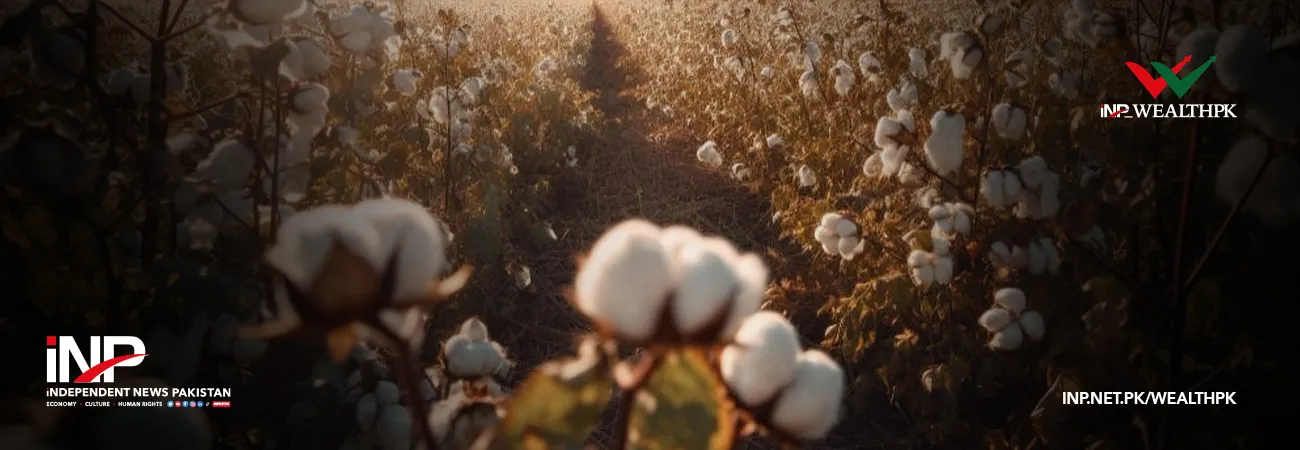INP-WealthPk
Muhammad Saleem
Climate change is posing a serious threat to the cotton crop, jeopardizing the viability of textile sector and the financial condition of growers. Dr Hussain, a faculty member at the University of Agriculture, Faisalabad, said the impact of climate change on the cotton crop was profound, hitting the textile sector, the mainstay of Pakistan's economy. Talking to WealthPK, he said the varsity was conducting research on climate change's impact on cotton and other crops and trying to come up with viable solutions. "It seems our policymakers and farmers are underestimating climate change's impact on agriculture. We have to face this stark reality, and change our cultivation patterns accordingly." He said people sitting at the helm of affairs needed to be told that climate change was a global phenomenon, and they had to take urgent steps to minimize its impact on different sectors of the economy. "Erratic rainfall patterns, rising temperatures, floods, heatwaves and droughts are the result of climate change. These patterns have started to impact agriculture, particularly the cotton crop," Dr Hussain said. The faculty member said these trends were affecting the cotton yield as droughts were leading to water shortages and excessive rainfalls were causing waterlogging.
"Both conditions are a whammy for farmers and the cotton crop." He called for devising strategies to address climate change's impact on the country's agriculture. Punjab's Minister for Agriculture, Syed Ashiq Hussain, told WealthPK that he recently visited the Cotton Research Institute, Multan, and met with scientists there. He said he had directed the scientists to come up with new cotton seed varieties that could withstand climate change effects, and resist pink bollworm and whitefly infestations. He said a strategy was being evolved to test the cotton varieties developed at the Multan Institute in other areas to check their growth potential. "We have to fight on two fronts: profitability for farmers and sustainability of agriculture. Efforts are underway to achieve the set targets." He said scientists were working to ensure the growth of the textile industry. Ashiq said different research centers would be established in Punjab to improve the quality and production of cotton and other crops. "The government will spend Rs1.5 billion on this initiative." Fazal Ali, a progressive grower, told WealthPK that farmers needed to adapt to the latest methods, like drip irrigation, amid rising water shortages. "Amid the climate change issues, we have to introduce early-maturing cotton varieties that have the strength to withstand heatwaves."
He said the universities and agricultural scientists should focus on research on how to make farmers adapt to the changing weather patterns to avoid any reduction in their yields. Zahid Ali, a yarn trader, said cotton was a vital cash crop and backbone of Pakistan's textile sector. "Shortage of cotton buffets the entire textile chain, leading to financial strain for spinning mill owners." He said that by taking advantage of the cotton shortage, the millers wasted no time in increasing the yarn rates, putting pressure on the weaving sector. He commended the Punjab government's focus on enhancing cotton cultivation. "Changing weather patterns, speculative buying, monopoly and unpredictable price mechanisms are hitting the cotton crop." Pakistan heavily relies on the agriculture sector, and cotton plays an instrumental role in strengthening its economy, he added. Dr Hussain of the Faisalabad varsity said that high temperatures were not good for cotton crops as they could hit their fiber length and strength. Besides, he said that due to extreme weather conditions, farmers might face yield losses, which could lead to premature boll shedding. "These challenges will affect the farmers' financial position significantly and hit the cotton industry."
Credit: INP-WealthPk













